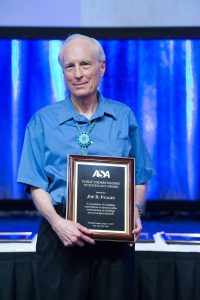Closing the Gap
By Alix P ‘ 18
Department of Sociology’s Distinguished Professor Joe Feagin added another award to his collection: the Award for Public Understanding of Sociology from American Sociological Association (ASA).
 “I am very grateful for this professional honor from the American Sociological Association, as its recognizes my extensive work over 5 decades, as well as my research with a diverse array of dozens of national and overseas media reporters and with many student groups,” Feagin said.
“I am very grateful for this professional honor from the American Sociological Association, as its recognizes my extensive work over 5 decades, as well as my research with a diverse array of dozens of national and overseas media reporters and with many student groups,” Feagin said.
This award, which recognizes a person who has “made exemplary contributions to advance the public understanding of sociology, sociological research, and scholarship among the general public,” will be presented to Feagin in New York City at the Annual Meeting in August.
Feagin’s celebrated career in the fields of race relations, gender inequality, and systemic racism/sexism are considered groundbreaking and influential to social scientists around the world. With the ASA alone, Feagin has received three awards, including the association’s most prestigious W.E.B. Du Bois Career of Distinguished Scholarship Award. He also served as president for the organization from 1999-2000.
Other honors Feagin has received include American Association for Affirmative Action’s Arthur Fletcher Lifetime Achievement Award, the Soka Gakkai International-USA Social Justice Award, and becoming a Fellow for Stanford University’s Center for the Study of Poverty and Inequality. He is also the Ella C. McFadden Professor in sociology.
His career began with a Ph.D. in sociology from Harvard University and has expanded to researching and teaching about racial and gender discrimination. He has published over 70 books and authored more than 200 articles for esteemed publications. Most recently, Feagin also helped launch the website Racism Review, designed to function as a reliable source of information for those seeking evidence-based research on topics concerning race in shaping U.S. society.
On this Martin Luther King, Jr. Day, Feagin’s work is relevant now more than ever. In the new edition of his book Racist America, which explores racism in contemporary America, Feagin writes about MLK:
[Dr. Martin Luther King, Jr.] noted that a major problem was getting whites to understand the meaning of the civil rights movement, for there is “not even a common language when the term ‘equality’ is used. Negro and white have a fundamentally different definition.”
Dr. King then added… “Most whites in America in 1967, including many persons of goodwill, proceed from a premise that equality is a loose expression for improvement. White America is not even psychologically organized to close the gap—essentially it seeks only to make it less painful and less obvious but in most respects to retain it.”
Dr. King’s commentary is as accurate now as then.
Feagin also advocates for closing the gap of misunderstanding, saying, “My work [is] trying to get the general public, Americans at several age levels, to better understand and counter our basic problems of systemic racism and systemic sexism.”
Earning awards like the Award for Public Understanding of Sociology highlights the significance of his work. Feagin continues the crucial conversation about what racial relations in America look like today, and demonstrates how that conversation can move us forward.
